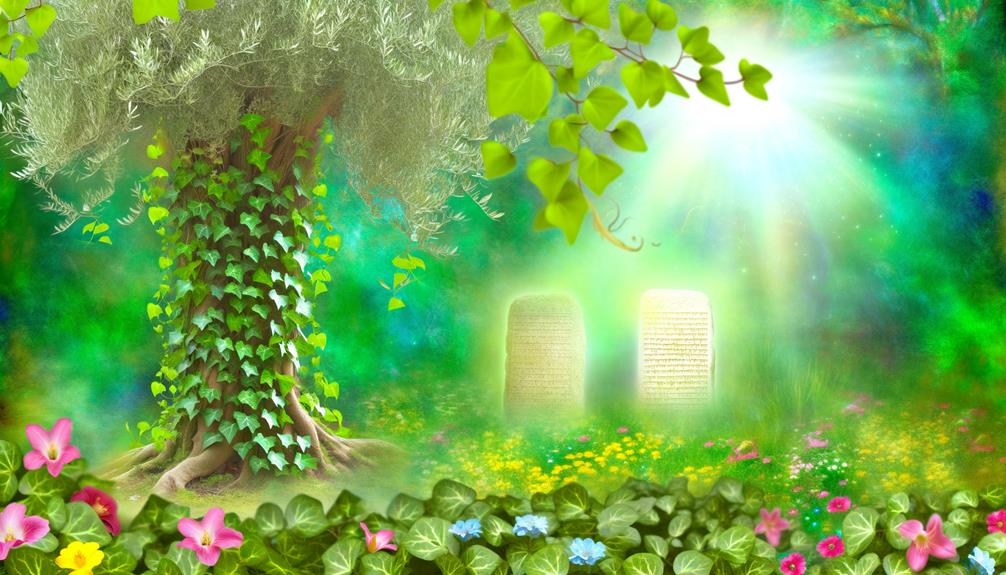Phyllis Meaning in the Bible: Name Origins
The name Phyllis, while rooted in Greek mythology and the tragic tale of a Thracian princess, holds symbolic significance that aligns with biblical motifs of life, growth, and spiritual renewal. Foliage in Scripture often symbolizes prosperity and divine blessing, akin to the thriving greenery associated with Phyllis.
Additionally, her connection to an almond tree, a sign of awakening and hope, mirrors the biblical Tree of Life, which signifies eternal life and spiritual sustenance. This convergence of ancient Greek and biblical symbolism enriches our understanding of enduring life and spiritual flourishing.
Continuing on, one may unearth deeper intersections of these themes.

Key Takeaways
- The name ‘Phyllis’ is not directly mentioned in the Bible.
- Phyllis has Greek mythological origins, not biblical roots.
- Symbolically, Phyllis connects to themes of love, transformation, and nature.
- Biblical narratives also explore themes of life, growth, and renewal through foliage.
Greek Origins of Phyllis

The name ‘Phyllis’ finds its roots in ancient Greek mythology, where it is associated with the story of a Thracian princess who transformed into an almond tree out of love and despair. This narrative encapsulates themes of unrequited love and metamorphosis, reflecting broader Greek cultural values and mythological traditions.
Phyllis was deeply in love with Demophon, a son of Theseus, who failed to return from the Trojan War as promised. In her sorrow, Phyllis’s transformation symbolizes both eternal love and the anguish of abandonment.
The tale emphasizes the Greek penchant for intertwining human experiences with nature, serving as a poignant reminder of the emotional depth and symbolic richness inherent in ancient myths.
This context is essential in understanding the subsequent adoption and adaptation of the name.
Symbolism of Foliage

In many cultural and religious contexts, foliage often symbolizes life, growth, and renewal, serving as powerful metaphors that convey deeper spiritual and existential meanings.
In the Bible, foliage is frequently used to illustrate various theological and moral lessons, reflecting the intricate relationship between nature and divine principles.
This symbolism includes:
- Green leaves: Representing liveliness and prosperity.
- Withering foliage: Indicating spiritual decay or divine judgment.
- Blossoming branches: Signifying hope and new beginnings.
- Dense forests: Symbolizing mystery and divine presence.
Tree of Life Connection

Amidst the rich tapestry of foliage symbolism in the Bible, the Tree of Life stands as a profound emblem of eternal life, divine wisdom, and spiritual sustenance. This ancient symbol appears prominently in the Book of Genesis, offering insight into humanity’s original communion with God. Not merely a physical tree, it represents a divine source of nourishment and enlightenment.
The Tree of Life reemerges in the Book of Revelation, symbolizing the ultimate restoration and healing of nations. Within this framework, the connection to Phyllis—whose name means ‘foliage’—can be interpreted as a metaphorical link to enduring life and growth.
Consequently, understanding Phyllis through the lens of the Tree of Life enriches our grasp of biblical themes related to spiritual importance and divine connection.
Eden’s Restoration Themes

Echoing through biblical narratives, Eden’s restoration themes encapsulate the profound yearning for a return to divine harmony and the original state of human innocence. This theme permeates various scriptures, symbolizing a divine promise and a future hope for humanity.
Key elements recurrent in these texts include:
- Covenantal Promises: God’s assurances to His people, often highlighting restoration and peace.
- Prophetic Visions: Revelations that depict a renewed Earth, free from sin and suffering.
- Messianic Hope: The anticipated arrival of a savior who would restore all things.
- Moral Renewal: Calls for repentance and a return to righteous living.
These components collectively underscore the biblical vision of redemption and restoration.
Flourishing in Scripture

Rooted deeply in biblical texts, the concept of flourishing encapsulates the divine intention for human well-being and spiritual prosperity. Flourishing is depicted through metaphors like the fruitful vine and the thriving tree, symbolizing a life blessed by God. Psalm 1:3 and John 15:5 illustrate this divine promise of growth and fulfillment.
| Scripture Reference | Description |
|---|---|
| Psalm 1:3 | A tree planted by streams of water |
| John 15:5 | The vine and branches metaphor |
| Jeremiah 17:8 | A tree by the water, unyielding |
| Matthew 13:8 | Parable of the sower, fruitful soil |
| Proverbs 11:28 | The righteous will flourish |
These passages collectively emphasize that spiritual alignment with God’s will results in a life of abundance and resilience.
Conclusion
The name Phyllis, rooted in Greek origins and symbolizing foliage, finds profound resonance within Biblical themes.
Echoes of the Tree of Life and Eden’s restoration are subtly intertwined, reflecting a narrative of flourishing and renewal.
This confluence of etymology and theology underscores a deeper spiritual metaphor, inviting a contemplation of growth and energy.
Consequently, the essence of Phyllis in scripture emerges as a witness to perennial rejuvenation, akin to the ceaseless cycles of nature depicted in sacred texts.






